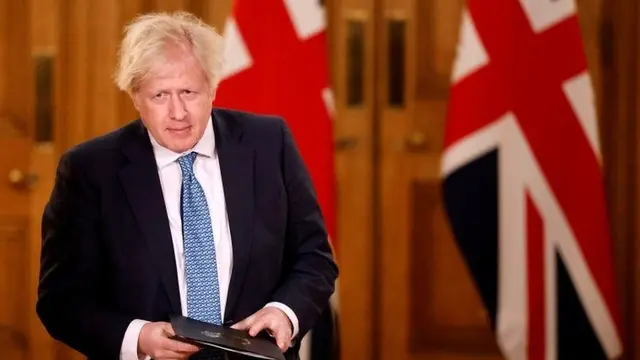Theresa May will urge the warring Brexit tribes to put their differences behind them on Friday as she promises to deliver a deal with Brussels that will keep Britain an “open, outward-looking, tolerant, European democracy”.
In a carefully calibrated speech, its platform hastily relocated from Newcastle to London’s Mansion House because of the severe weather, the prime minister will make a deliberate overture to anxious remain voters.
“We must bring our country back together, taking into account the views of everyone who cares about this issue, from both sides of the debate”, she will say, addressing her own divided party, as well as the public. She will insist that the EU referendum result in 2016 was “not a vote for a distant relationship with our neighbours”.
May’s intervention, the last of a series of speeches by key cabinet ministers, comes at the end of a tumultuous week, in which she has clashed with Brussels over the issue of Northern Ireland, and seen Jeremy Corbyn praised by business groups for his decision to endorse a customs union.
She will make clear that Britain is aiming at a free-trade deal with Brussels, not a customs union, but will insist it should be “the broadest and deepest possible agreement, covering more sectors and cooperating more fully than any free trade agreement anywhere in the world today”.
Anti-Brexit protestors wave flags outside Downing Street as European Council President Donald Tusk meets Britain’s Prime Minister Theresa May in London.
Downing Street hopes her emollient tone will help assuage the concerns of backbench Tory rebels considering voting against the government on forthcoming legislation, including the trade bill, to force a softer Brexit.
With Britain hoping negotiations in Brussels will shift to the nature of the economic relationship after EU leaders meet this month, May will also set out five tests that she says any deal must meet.
As well as her long-held pledge to “take back control” of Britain’s borders, laws and money, she will insist any agreement must be “consistent with the kind of country we want to be as we leave, a modern, open, outward looking, tolerant, European democracy”.
She will warn that any new relationship must protect jobs and security; and be enduring so that both sides do not end up back at the negotiating table.
And after a week in which the Irish border has sparked a fresh clash between Britain and Brussels, she will say the deal must “strengthen the precious union” for all.
Speeches early in May’s premiership pledging a “red, white and blue Brexit”, and criticising footloose “citizens of nowhere”, underlined concerns in her own party that she had read the referendum result as a signal to jettison the liberal Conservatism championed by David Cameron.
But in the speech, which was signed off by every member of her cabinet at a specially convened meeting on Thursday, she will insist she can reconcile the Brexiters’ desire to reclaim sovereignty, with a close continuing relationship with the EU.
“While the means may change our shared goals surely have not – to work together to grow our economies and keep our people safe,” she will say.
She will set out more details of the “managed divergence” strategy struck at last week’s Chequers awayday with her eleven-strong Brexit strategy team. That would mean pledging to maintain high regulatory standards, while retaining the power to allow Britain’s rules to diverge from the EU’s over time.
The EU27’s chief negotiator, Michel Barnier, has repeatedly demanded a clearer picture from May and her colleagues of what they hope to achieve.
The shadow Brexit secretary, Keir Starmer, said the pressure on May was intense, after Labour’s policy shift was welcomed by businesses and trade unions.
Starmer told the Guardian: “The test for Theresa May is whether she can follow Labour’s lead. Can she overcome the deep divisions within her government and set out a coherent, credible vision for Britain’s future relationship with the European Union after Brexit? Can she stand up to the extreme Brexiters within her party and lead the country through the most difficult negotiations in our country’s recent history? It’s a test of leadership, strength and resilience. If she fails this test Labour is waiting in the wings.”
Several key ministers had already been given drafts of the speech to look over on Wednesday evening; but others got just half an hour to read it at No 10 before Thursday’s cabinet meeting began. Brexiters demanded a number of minor changes to ensure it was sufficiently “optimistic”.
May expressed to Donald Tusk, the European council president, her disquiet about the European commission’s proposals for dealing with the border in Northern Ireland. He had a longer than expected meeting with her in Downing St at lunchtime on Thursday.
Tusk warned the prime minister that it was down to her to find a solution to the Northern Ireland border problem if she rejected the commission’s backstop plan for a common customs area across the island. As they posed for a photocall Tusk could also be heard telling May that he did not like her “red lines”.
Speaking to BBC Radio 4’s Today programme on Friday morning, Starmer said he agreed with May’s rejection of the commission’s proposal, but echoed Tusk in saying she needed, then, to come up with a solution.
“I agree with her: it’s simply not a road that we could go down. But that really ramps up the pressure on her to say what is the answer.
“On Monday, Labour answered that question – we stepped up to that challenge and said: ‘Look, a customs union with the EU, a strong single market relationship, is a long way to answering this question’.
“Theresa May needs to follow. So, I agree with her in rejection of what was put on the table on Wednesday, completely agree with her about that. But, really, it puts the ball so firmly in her court that she has got to deal with it today.”
(GUARDIAN)
 简体中文
简体中文

